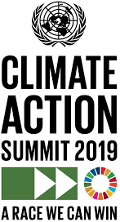|
Climate Action Summit: Some Small Promises
September 24, 2019
Guterres opened proceedings with an impassioned plea for urgent action and then set a goal of making the world carbon neutral by 2050.
Carbon neutrality results when as much is absorbed as is emitted. At present, the balance is tilted very much in favor of emissions. More than 60 nations have announced plans to cut greenhouse gas emissions to tiny amounts. A few dozen more have promised to consider doing the same in the next year, with an eye toward carbon neutrality by mid-century. Specific examples of actions that some countries have taken:
However, the three countries that emit the largest amounts of greenhouse gases–China, the United States and India–offered no concrete plans to deal with what is expected to be a global crisis if temperatures continue to rise. A total of 194 other countries have signed on to the agreement. Only three countries have not: Nicaragua, Syria, and the U.S. The Paris Agreement calls for a commitment from the world's nations to limit global warming to 2 degrees Celsius above pre-industrial levels; even that amount of temperature increase will bring about dramatic change, and so the target preferred by the Intergovernmental Panel on Climate Change is 1.5 degrees Celsius. Recent reports show that in the four years since the Paris Agreement, global temperatures have already risen an average of 1 degree Celsius. Famed teen climate activist Greta Thunberg addressed the U.N., taking world leaders to task for leaving solutions to future generations. She also announced that she and a group of children ages 8 to 17 have filed a legal complaint with the U.N., targeting a handful of nations for ignoring climate science. Those nations are Argentina, Brazil, France, Germany, and Turkey. Elsewhere in the U.S., climate activists continued their protests in various cities. One particularly large protest in Washington, D.C., spilled over into commuter streets, forcing some to shut. The climate summit and the protests took place against the backdrop of a weeklong set of events, which began with a worldwide number of protests and rallies that drew 4 million people. Various events are planned in countries around the world this week, and another ClimateStrike is planned for Friday. Also at the U.N., Thunberg and 700 other youths from around the world gathered for a Youth Climate Summit. |
Social Studies for Kids |
Social Studies for Kids
copyright 2002–2024
David White



 United Nations Secretary-General Antonio Guterres convened the Climate Action Summit at U.N. headquarters in New York, a day ahead of the 74th General Assembly. Most world leaders were in attendance, and many spoke at the climate summit.
United Nations Secretary-General Antonio Guterres convened the Climate Action Summit at U.N. headquarters in New York, a day ahead of the 74th General Assembly. Most world leaders were in attendance, and many spoke at the climate summit.

